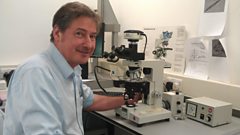Antarctica weather and climate change; GM Fish Oils; Melanin Fossils; Time Travel
Dramatic changes in Antarctic pack ice trapped scientists over Christmas. John Turner of the British Antarctic Survey underlines the difference between weather and climate change.
Scientists following in the footsteps of Edwardian explorer, Douglas Mawson, have been trapped in pack ice in the Antarctic. The Chinese vessel that came to their rescue also became "beset" in the ice. The 大象传媒's Andrew Luck Baker talks to Adam Rutherford about the catacylsmic event that caused multi-year ice to break away and trap the Academik Shokalskiy and Professor John Turner of the British Antarctic Survey underlines the importance of differentiating between extreme weather events and the impact of climate change.
A team at Rothamsted Research in Hertfordshire has succeeded in genetically engineering plant seeds to contain the Omega-3 oil usually found in oily fish. Seeds from Camelina sativa (false flax) plants were modified using genes from microalgae - the primary organisms that produce these beneficial fatty acids.The oil has now been incorporated into salmon feed to assess whether it's a viable alternative to wild fish oil. Dr Johnathan Napier tells Melissa Hogenboom that he hopes the plants will provide a sustainable source of long chain polyunsaturated fatty acids.
From fossils we know an awful lot about the animals that walked on the Earth, swam in the sea and flew in the air. But fossils have never been good at revealing the colour of these animals. With increasingly sophisticated sampling techniques however, scientists are starting to get a much better, technicolour glimpse into these extinct fauna. And it turns out that colour played a much more important role than just camouflage and decoration. Johan Lindgren form Lund University in Sweden has been finding out how the pigment, melanin, allowed ancient marine reptiles to travel all over the oceanic globe.
Show Us Your Instrument: Dr Andrew Polaszek, Head of Terrestrial Invertebrates at the Natural History Museum reveals his compound microscope (with Nomarski Differential Interference Contrast) which he uses to discover "hidden biodiversity", particularly in parasitoid wasps.
Stephen Hawking threw a party for time travellers and issued the invitation after the event. Astrophysicists after a long poker game decided to use Twitter instead, to flush out the time travellers in our midst. Professor Robert Nemiroff from Michigan Tech University and his students mined social media for references to the Comet ISON and the naming of the new Pope Francis, before both those events had actually happened.
Producer: Fiona Hill.
Last on
Clip
Broadcasts
- Thu 9 Jan 2014 16:30大象传媒 Radio 4
- Thu 9 Jan 2014 21:00大象传媒 Radio 4
Explore further with The Open University
Discover more fascinating science content with The Open University
Podcast
-
![]()
大象传媒 Inside Science
A weekly programme looking at the science that's changing our world.



